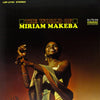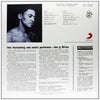



Miriam Makeba – The World Of Miriam Makeba
RARITY – sealed
Vocal - Miriam Makeba
Conductor – Hugh Masekela
Written by Miriam Makeba (A1, A3-4, B1-2, B5), B. Parker (A2), M. Lanjean (A2), Jonas Gwangwa (A5), Dorival Caymmi (A6), Carol Hall (B3), Francisco Flores (B4), Fuld (B6), Berland, Miller (B6)
1LP, Standard sleeve
Original analog Master Tape : YES
Heavy Press : 180g
Record Color : Black
Speed : 33 RPM
Size : 12’’
Stereo
Studio
Record Press : Pallas (Germany)
Label : Speakers Corner
Original Label : RCA Victor
Recorded in June 20, 1963 - July 1, 1963 at Studio RCA Studio A (New York City)
Engineered by Mickey Crofford
Produced by Hugo & Luigi
Liner Notes by Adam Barnes
Originally released in October 1963
Reissued in 2011
Tracks :
Side A:
1. Dubula
2. Forbidden Games
3. Pole Mze
4. Little Boy
5. Kwedini
6. Vamos Chamar Ovento
Side B:
1. Umhome
2. Amampondo
3. Wonders and Things
4. Tonados Di Media Noche
5. Into Yam
6. Where Can I Go?
Reviews:
"Miriam Makeba returned to RCA Victor Records for her third album, which was given more of a pop sheen by producers Hugo & Luigi, who employed an orchestra conducted by Makeba find Hugh Masekela (soon to be the singer's husband). As usual, the song list consisted mostly of originals sung by Makeba in her native language, but there were also some songs sung in English, such as the tango "Forbidden Games," the Negro spiritual "Little Boy," and "Where Can I Go?" (which appeared to comment directly on her stateless status since being banned from South Africa), while Makeba performed "Tonados de Media Noche" in Spanish and "Vamos Chamar Ovento" in Portuguese. Her profile had expanded since her self-titled RCA debut in 1960, and even since her Kapp Records release The Many Voices of Miriam Makeba a year earlier, both musically and in terms of her political status as an opponent of apartheid (the liner notes mentioned her appearance before the United Nations), and that may have helped make The World of Miriam Makeba her first commercial success on records." AllMusic Review by William Ruhlmann
Miriam Makeba (born March 4, 1932, Prospect Township, near Johannesburg, South Africa—died November 10, 2008, Castel Volturno, near Naples, Italy) was a South African-born singer who became known as Mama Afrika, one of the world’s most prominent Black African performers in the 20th century.
The daughter of a Swazi mother and a Xhosa father, Makeba grew up in Sophiatown, a segregated Black township outside of Johannesburg and began singing in a school choir at an early age. She became a professional vocalist in 1954, performing primarily in southern Africa. By the late 1950s her singing and recording had made her well known in South Africa, and her appearance in the documentary film Come Back, Africa (1959) attracted the interest of Harry Belafonte and other American performers. With their help, Makeba in 1959 settled in the United States, where she embarked on a successful singing and recording career. She sang a variety of popular songs but especially excelled at Xhosa and Zulu songs, which she introduced to Western audiences. She also became known for songs that were critical of apartheid. In 1960 she was denied reentry into South Africa, and she lived in exile for three decades thereafter. In 1963 the South African government banned her records and revoked her passport. In 1964 she married trumpeter and fellow Belafonte protégé Hugh Masekela. Although the couple divorced two years later, they maintained a close professional relationship. In 1965 she and Belafonte won a Grammy Award for best folk recording for their album An Evening with Belafonte/Makeba.
Makeba married the American Black activist Stokely Carmichael in 1968 (divorced 1979), a circumstance that led to the decline of her career in the United States. She relocated with Carmichael to Africa, settled in Guinea, and then moved to Belgium, continuing to record and tour in Africa and Europe. Her autobiography, Makeba: My Story (coauthored with James Hall), appeared in 1988. In 1990 the South African Black activist Nelson Mandela, who had just been released from his extended imprisonment, encouraged Makeba to return to South Africa, and she performed there in 1991 for the first time since her exile. Although she was plagued by health problems, she continued to perform in subsequent years, and she died of a heart attack shortly after giving a concert in Italy in 2008.
Among the songs for which she was internationally known were “Pata Pata” and one known as the “Click Song” in English (“Qongqothwane” in Xhosa); both featured the distinctive click sounds of her native Xhosa language. Makeba made 30 original albums, in addition to 19 compilation albums and appearances on the recordings of several other musicians.
Ratings :
AllMusic : 4 / 5 ; Discogs : 5 / 5 ; Encyclopedia of Popular Music : 3 / 5

